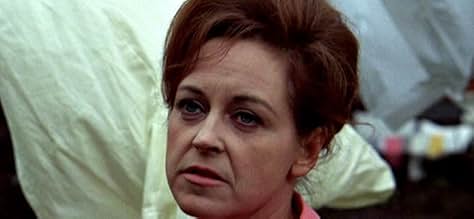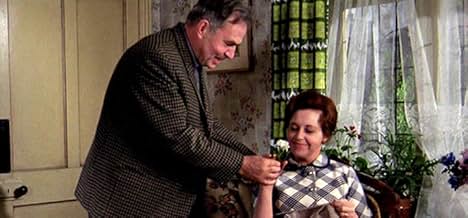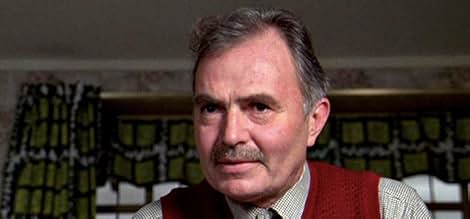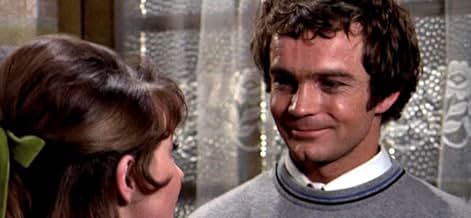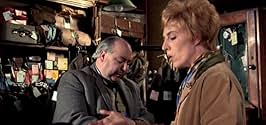ÉVALUATION IMDb
7,0/10
1,1 k
MA NOTE
Ajouter une intrigue dans votre langueA stern father and lenient mother try to deal with the ups and downs of their four children's lives in working-class Bolton.A stern father and lenient mother try to deal with the ups and downs of their four children's lives in working-class Bolton.A stern father and lenient mother try to deal with the ups and downs of their four children's lives in working-class Bolton.
Reginald Green
- Bowler 1
- (as Reg Green)
Avis en vedette
Outside the household is a different world and the family struggle to tread the line between Dads authority and their hopes and dreams.
The period is captured; The bakelite light swithes, the Georgian floorpan, the picture rails, the wall paper, the short skirts, the cheeky lads, the Mini van, shiny modern mangles....
The location is captured; A wind lashed glacier hewn rocky landscape, walls of local stone, community, freedom.
But there is much much more; Childhood, happiness, sensuality, pride, values, freedom, authority, rebellion, violence (in the deepest sense), love, struggle, puberty, naivety, morality, trust, faith, deceit, machismo, manners, maturity, loss, poverty, sacrifice, horror, acceptence, revelation, comedy and parenthood are all there. (And in no particular order!).
This film is a richly woven expression of family tensions that are as relevent today as ever. The fact that some of these aren't tackled directly is testament in itself to the attitudes of the day but the fact that they are all here is a testament to the acting skill, the story and the direction.
If there's anything bad about this film, it's that all this deeply entrenched and wonderfully enacted tension is swept away a little too lightly towards the end. Maybe I missunderstand - the doom and gloom felt by many teenagers really does disappear if they deal with it (**) - maybe the film is trying to send even that message too - well worth doing.
What is the film trying to say? Kids: Parents were young too, parents struggle too, everyone makes mistakes, everyone learns, things change, struggle can end happily. Parents: Don't try too hard! Try to remember that your support is the key to their well being.
It sounds simplistic doesn't it? Sometimes the film feels like that too but it's then that you notice how much is being being challenged and uncovered.
The film is a classic.
(**) - Not the problems themsleves.
The period is captured; The bakelite light swithes, the Georgian floorpan, the picture rails, the wall paper, the short skirts, the cheeky lads, the Mini van, shiny modern mangles....
The location is captured; A wind lashed glacier hewn rocky landscape, walls of local stone, community, freedom.
But there is much much more; Childhood, happiness, sensuality, pride, values, freedom, authority, rebellion, violence (in the deepest sense), love, struggle, puberty, naivety, morality, trust, faith, deceit, machismo, manners, maturity, loss, poverty, sacrifice, horror, acceptence, revelation, comedy and parenthood are all there. (And in no particular order!).
This film is a richly woven expression of family tensions that are as relevent today as ever. The fact that some of these aren't tackled directly is testament in itself to the attitudes of the day but the fact that they are all here is a testament to the acting skill, the story and the direction.
If there's anything bad about this film, it's that all this deeply entrenched and wonderfully enacted tension is swept away a little too lightly towards the end. Maybe I missunderstand - the doom and gloom felt by many teenagers really does disappear if they deal with it (**) - maybe the film is trying to send even that message too - well worth doing.
What is the film trying to say? Kids: Parents were young too, parents struggle too, everyone makes mistakes, everyone learns, things change, struggle can end happily. Parents: Don't try too hard! Try to remember that your support is the key to their well being.
It sounds simplistic doesn't it? Sometimes the film feels like that too but it's then that you notice how much is being being challenged and uncovered.
The film is a classic.
(**) - Not the problems themsleves.
No matter what mood I'm in, this film always sorts me out. I can't count the times I've watched it, at any time of the day or night. It is the most basic of love stories, showing that the ties that bind a family are often stretched to the limit, but cannot be broken. I have over 500 films in my collection and I don't think there's a more romantic moment in any, than when James Mason takes of his jacket and puts is round Diana Coupland's shoulders. I remember feeling the tenderness of that moment when I first saw the film in the cinema as a young teenager and now I am 50 and it still makes me shiver. There's never been another film which comes anywhere near it. My old video is just about played out and I've copied it on to DVD, but I would love to know if anyone has ever seen it for sale on DVD.
To put it simply, I enjoyed this film. The reason for my interest & enjoyment was not related to anything other than the subject matter itself. I had heard tales from my mother and grandmother about how Northern England working class life and attitudes used to be (as experienced by them)and this is an interesting depiction that seems to faithfully represent what they told me. In particular, the paternalistic but overbearing father who "knows" what is best for his family along with his stubborness when this paradigm is challenged. (Not much has changed there then!!)
People who have seen the play will probably be disappointed with the film because the story does not easily transfer across the different media. In a sense however, the film is an historical document and I personally enjoyed it, if only because of the way it conveyed a social phenomenon.
People who have seen the play will probably be disappointed with the film because the story does not easily transfer across the different media. In a sense however, the film is an historical document and I personally enjoyed it, if only because of the way it conveyed a social phenomenon.
The golden age of the British "kitchen sink" film was the late fifties and early sixties, the age of "Look Back in Anger", "Woman in a Dressing Gown", "A Taste of Honey", "Saturday Night and Sunday Morning", "A Kind of Loving" and others. There were, however, a few excellent examples from the late sixties, such as "Alfie", "Kes" and "Spring and Port Wine". (I know that IMDb gives the date of this last as 1970, but in the closing credits of the film itself it is given as MCMLXIX, or 1969). . These latter three films were all in colour, whereas all the earlier examples cited were in black-and-white. Like "Alfie", "Spring and Port Wine" was based on a stage play by Bill Naughton.
The film is set in Bolton and concerns the working-class Crompton family, especially the patriarch, Rafe. Rafe, a factory worker, is a very conservative figure, not in the sense that he is politically right- wing- if anything, he inclines to the Left- but in the sense that he is traditional in his social attitudes. He is deeply religious and patriotic (he cannot understand people who go abroad for their holidays), and a lover of serious literature and classical music. Above all he takes a very old-fashioned view of family life; the father is head of the household and is owed unquestioning obedience from his wife and from his children, at least as long as they are living under his roof. Something of his attitudes can be gauged from the fact that he has named his four children Harold, Wilfred, Florence and Hilda, all names which would have been regarded as absurdly old-fashioned by most parents of Rafe's generation. (Some of those names, particularly Florence, have made something of a comeback since the sixties).
It must be said, however, that Rafe's attitudes are not always consistent- he claims to hate waste and extravagance, and makes his wife Daisy keep detailed housekeeping accounts, yet will happily spend forty guineas (two week's wages for the average working man at this period) on an expensive bespoke overcoat. (This coat will subsequently play an important role in the plot). Although he dislikes all manifestations of youth culture, especially pop music, and bemoans what he sees as the decline in morality in modern times, he seems unconcerned by the fact that his teenage daughter Hilda habitually wears a provocatively short mini-skirt.
The main theme of the film, a common one in the sixties, is the clash of values between old and young. An explanation of the rather enigmatic title is given in the original play, but this is omitted from the film; cinema audiences probably assumed that "Spring" referred to the rising young generation as contrasted with the "Autumn" of the old. (Hence the title of my review, borrowed from Gabriel Garcia Marquez). A crisis is provoked in the life of the Crompton family when Hilda, with the tacit support of her siblings, defies her father's authority by refusing to eat a herring for supper. Yet the Cromptons are not really a dysfunctional family. Although on the surface they do not demonstrate a good deal of love for one another, there are, beneath that surface, sufficient reserves of mutual respect and affection to help them cope with their difficulties. When a real crisis erupts in Hilda's life, she will find that her father is there for her.
The film's two internationally known stars are James Mason and Susan George, and both are excellent here. George's career was later to suffer from her being typecast as wild young sexpots, which made it difficult for her to get decent parts as she got older; she made few major films after 1980. It has, however, to be admitted that she could be very good in her limited range, and here as the rebellious young Hilda, a nonconformist in a deeply conformist household, she gives one of her best performances. (She was only nineteen at the time). Mason had the previous year in "Mayerling" played another autocratic father, albeit one from a very different social background, the Austrian Emperor Franz Josef. That had been one of his weaker films, but he is much better here as Rafe, the traditionalist trying hard to come to terms with the fact that the traditions he holds dear are no longer universally accepted. Other contributions of note come from Diana Coupland as Daisy, Hannah Gordon as Hilda's milder, more conciliatory older sister Florence, and Avril Elgar as Betsy-Jane Duckworth, the Cromptons' sluttish, slatternly neighbour.
The film was directed by Peter Hammond, better known as a television actor. It appears to be the only feature film he ever made as director, but it is an excellent one. Like many British films it has a strong sense of place, something deriving from extensive use of real Bolton scenes. As in many industrial Northern towns, the late sixties and early seventies were a period of extensive change in Bolton, a period when many historic buildings were being demolished to make way for modernistic, often ill thought-out, urban redevelopment schemes, and much of this transformation is clearly visible in the film. (Something similar can be seen in another British film from around the same time, "Get Carter" set in Newcastle). It seemed to me that Hammond was using these scenes as a visual metaphor for a similar transformation taking place at the heart of the Crompton family as the old inexorably gives way to the new. 8/10
The film is set in Bolton and concerns the working-class Crompton family, especially the patriarch, Rafe. Rafe, a factory worker, is a very conservative figure, not in the sense that he is politically right- wing- if anything, he inclines to the Left- but in the sense that he is traditional in his social attitudes. He is deeply religious and patriotic (he cannot understand people who go abroad for their holidays), and a lover of serious literature and classical music. Above all he takes a very old-fashioned view of family life; the father is head of the household and is owed unquestioning obedience from his wife and from his children, at least as long as they are living under his roof. Something of his attitudes can be gauged from the fact that he has named his four children Harold, Wilfred, Florence and Hilda, all names which would have been regarded as absurdly old-fashioned by most parents of Rafe's generation. (Some of those names, particularly Florence, have made something of a comeback since the sixties).
It must be said, however, that Rafe's attitudes are not always consistent- he claims to hate waste and extravagance, and makes his wife Daisy keep detailed housekeeping accounts, yet will happily spend forty guineas (two week's wages for the average working man at this period) on an expensive bespoke overcoat. (This coat will subsequently play an important role in the plot). Although he dislikes all manifestations of youth culture, especially pop music, and bemoans what he sees as the decline in morality in modern times, he seems unconcerned by the fact that his teenage daughter Hilda habitually wears a provocatively short mini-skirt.
The main theme of the film, a common one in the sixties, is the clash of values between old and young. An explanation of the rather enigmatic title is given in the original play, but this is omitted from the film; cinema audiences probably assumed that "Spring" referred to the rising young generation as contrasted with the "Autumn" of the old. (Hence the title of my review, borrowed from Gabriel Garcia Marquez). A crisis is provoked in the life of the Crompton family when Hilda, with the tacit support of her siblings, defies her father's authority by refusing to eat a herring for supper. Yet the Cromptons are not really a dysfunctional family. Although on the surface they do not demonstrate a good deal of love for one another, there are, beneath that surface, sufficient reserves of mutual respect and affection to help them cope with their difficulties. When a real crisis erupts in Hilda's life, she will find that her father is there for her.
The film's two internationally known stars are James Mason and Susan George, and both are excellent here. George's career was later to suffer from her being typecast as wild young sexpots, which made it difficult for her to get decent parts as she got older; she made few major films after 1980. It has, however, to be admitted that she could be very good in her limited range, and here as the rebellious young Hilda, a nonconformist in a deeply conformist household, she gives one of her best performances. (She was only nineteen at the time). Mason had the previous year in "Mayerling" played another autocratic father, albeit one from a very different social background, the Austrian Emperor Franz Josef. That had been one of his weaker films, but he is much better here as Rafe, the traditionalist trying hard to come to terms with the fact that the traditions he holds dear are no longer universally accepted. Other contributions of note come from Diana Coupland as Daisy, Hannah Gordon as Hilda's milder, more conciliatory older sister Florence, and Avril Elgar as Betsy-Jane Duckworth, the Cromptons' sluttish, slatternly neighbour.
The film was directed by Peter Hammond, better known as a television actor. It appears to be the only feature film he ever made as director, but it is an excellent one. Like many British films it has a strong sense of place, something deriving from extensive use of real Bolton scenes. As in many industrial Northern towns, the late sixties and early seventies were a period of extensive change in Bolton, a period when many historic buildings were being demolished to make way for modernistic, often ill thought-out, urban redevelopment schemes, and much of this transformation is clearly visible in the film. (Something similar can be seen in another British film from around the same time, "Get Carter" set in Newcastle). It seemed to me that Hammond was using these scenes as a visual metaphor for a similar transformation taking place at the heart of the Crompton family as the old inexorably gives way to the new. 8/10
I have watched this film many times, and it always seems to get better. With great acting performance by James Mason, and the cast of this classic English film. If you have not seen it before, then I highly recommend that you do.
Le saviez-vous
- AnecdotesWhen Arthur accidentally drives into the back of a car at the traffic lights (while kissing Florence), the driver of the car in front is the film's producer, Michael Medwin.
- GaffesThe first scenes are on a Friday evening after work. However, later when Rafe goes to play bowls, it is a bright, sunny day with the shadows suggesting it was shot around mid-day.
- Citations
Rafe Crompton: There's no father alive who doesn't long to escape his captivity every now and then...
- ConnexionsEdited into Northern Soul (2014)
Meilleurs choix
Connectez-vous pour évaluer et surveiller les recommandations personnalisées
- How long is Spring and Port Wine?Propulsé par Alexa
Détails
- Date de sortie
- Pays d’origine
- Langue
- Aussi connu sous le nom de
- Hering und Portwein
- Lieux de tournage
- Sunnyside Mill, Bolton, Greater Manchester, Angleterre, Royaume-Uni(was on Adelaide St., now demolished)
- société de production
- Consultez plus de crédits d'entreprise sur IMDbPro
Box-office
- Budget
- 198 000 £ (estimation)
- Durée1 heure 41 minutes
- Mixage
Contribuer à cette page
Suggérer une modification ou ajouter du contenu manquant

Lacune principale
By what name was Spring and Port Wine (1970) officially released in Canada in English?
Répondre

